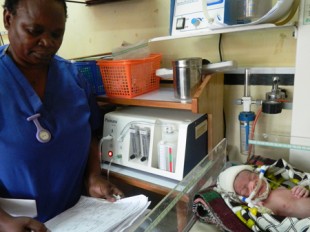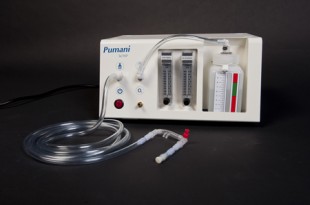Award will fund international rollout of student-created breathing technology
A low-cost device that Rice University bioengineering students invented to help premature babies breathe more easily will be rolled out to teaching hospitals in three African nations, thanks to a $400,000 award from pharmaceutical giant GlaxoSmithKline (GSK) and London-based charity Save the Children. The technology, which is known as “bubble CPAP,” earned the top prize in GSK and Save the Children’s inaugural Healthcare Innovation Award program.
The prize was won by Friends of Sick Children in Malawi, the charitable arm of the pediatric department of Queen Elizabeth Central Hospital in Blantyre, Malawi. The hospital, the University of Malawi College of Medicine and Rice University’s Rice 360°: Institute for Global Health Technologies are already partnering to distribute bubble CPAPs to 27 hospitals throughout Malawi. The funding from the Healthcare Innovation Award, along with backing from the Ministry of Health in Malawi, will allow Friends of Sick Children in Malawi and its partners to share the life-saving technology with teaching hospitals in Tanzania, Zambia and South Africa.

Neonatal nurse Florence Mwenifumbo monitors a newborn that is receiving bubble CPAP treatment at Queen Elizabeth Central Hospital in Blantyre, Malawi.
“This remarkable project shows what can be achieved through grassroots innovation, and we are delighted to be able to recognize the hard work of all involved,” said GSK Country Manager Todd Mavende, who announced the award winners in London. “It is saving lives of Malawi’s children today and can make a difference for millions of children around the world tomorrow.”
The Rice-invented technology is a low-cost version of “continuous positive airway pressure,” or CPAP, a standard feature of most neonatal units in the developed world. CPAP helps babies that are in respiratory distress by keeping their lungs inflated so they may breathe more easily. Respiratory distress claims the lives of about 1 million African newborns each year.
With a price around $6,000, conventional CPAP machines are too expensive for hospitals in the developing world. In 2010, a team of senior students from Rice University in Houston, Texas, invented bubble CPAP as a low-cost alternative. The team members — Jocelyn Brown, Michael Pandya, Joseph Chang, Haruka Maruyama and Katie Schnelle — created the technology as part Rice 360°’s award-winning, hands-on engineering education program Beyond Traditional Borders (BTB).
In clinical trials at Queen Elizabeth Central Hospital, bubble CPAP was shown to increase the survival rate of newborns with respiratory distress by 27 percent. It is estimated that the technology could save the lives of 178,000 African children if implemented continentwide.
In Malawi, bubble CPAP has been renamed “Pumani,” which means “breathe easy” in Chichewa, one of the languages spoken in Malawi. Pumani costs about 15 times less than traditional CPAP, and Rice 360°, Queen Elizabeth Central Hospital, the University of Malawi College of Medicine and the Malawi Ministry of Health are working together to distribute Pumani to Malawi’s 27 government hospitals.

Pumani, an award-winning low-cost device that Rice University students invented to help premature babies in Malawi breathe more easily, will be rolled out to teaching hospitals in Tanzania, Zambia and South Africa, thanks to a $400,000 innovation award from pharmaceutical giant GlaxoSmithKline and London-based charity Save the Children.
“We are thrilled to be working with Friends of Sick Children in Malawi, and the University of Malawi College of Medicine to expand the Pumani program and begin replicating its success in Tanzania, Zambia and South Africa,” said Rebecca Richards-Kortum, Rice’s Stanley C. Moore Professor and chair of the Department of Bioengineering and director of both BTB and Rice 360°.
“The award money from the GSK-Save the Children Healthcare Innovation Award program will allow us to extend the reach of this life-saving technology and save thousands of lives,” said Maria Oden, director of Rice’s Oshman Engineering Design Kitchen and co-director of BTB.
Pumani was one of five winning projects selected GSK and Save the Children from nearly 100 applications from 29 countries.
In other news this week, a separate University of Malawi College of Medicine proposal to expand the use of Pumani was named one of eight finalists for the first-ever $1 million Caplow Children’s Prize. The prize — the largest humanitarian prize dedicated to saving children’s lives in the world today — will be awarded next month in New York.
In September, Pumani was chosen by the United Nations as one of 10 “Breakthrough Innovations That Can Save Women and Children Now.” Thanks to the designation from the UN’s Every Woman, Every Child program, Pumani was displayed for the U.N. General Assembly Sept. 23 as part of an effort to mobilize governments, multilaterals, the private sector and civil society to address the major health challenges facing women and children around the world.
Later this month, GSK and Save the Children will convene a roundtable discussion with stakeholders and policymakers to honor the Friends of Sick Children in Malawi and to discuss the impact of the award on health innovation trends in Malawi.


Leave a Reply